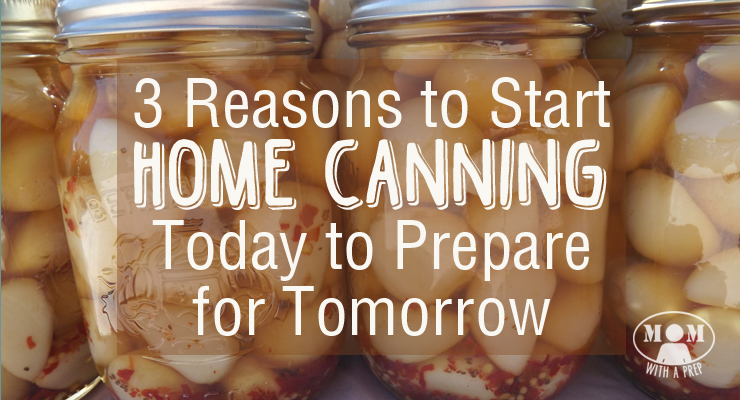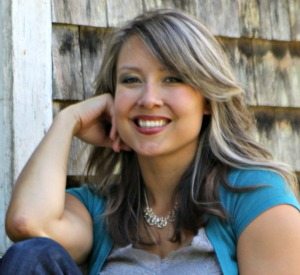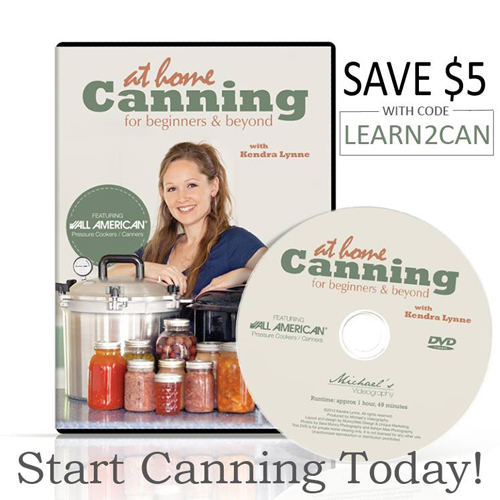
I’m excited to have Melissa K. Norris as my guest today as she talks about 3 Reasons to Start Home Canning Today to Prepare for Tomorrow. This is one of those areas I need a good kick in the butt to get started in, because canning scares me a little, but I know it’s so easy, ultimately!
Home canning can be a great way to prep for emergencies or to keep your home pantry stocked. I come from a long line of canners. In fact, I’ve never had a pantry without home canned goods in it. It was a way of life for my grandparents, parents, and now my family.
3 Reasons to Start Home Canning Today to Prepare for Tomorrow
There are many reasons home canning is making a come back in today’s society, only one of them being more self-reliant. For a prepper, canning has several advantages.
1. Home canned food is not dependent upon electricity. While frozen vegetables retain more of their nutrients than canned varieties, they’re also dependent upon a power source. In an emergency situation, power is usually not available. All of your frozen food will quickly spoil. Plus, it costs money to keep your food source safe when you’re freezing it. Other than the cost of new lids (a lid averages $0.17 a piece) home canned food is free once it’s on the shelf.
2. Home canned food doesn’t require a water source. The only thing required to eat home canned food is a heat source. You don’t have to use extra water (a valuable and sometimes scarce in an emergency-if you’re not a prepper-check out 8 Tips for Survival, Preparedness and Food Storage) to cook home canned food. You simply put it in your pot and heat the contents. This is another reason I love my pantry with home canned goods, it’s the ultimate healthy home version of fast food on busy days.
3. Home canned food usually has a higher nutritional value than store canned food. If you’re canning food grown from your own garden, a local farm or CSA (community supported agriculture), then it has higher nutritional value than store canned food. Vegetables and fruit grown at home have more nutrients and health benefits than a store (Learn more about the benefits of growing your own food). When we harvest our produce, it is in the jar and processed usually within the hour.
To learn more about home canning read my post on Waterbath Canning vs. Pressure Canning and listen to Home Canning 101 with 7 of my canning recipes to get you started.

Melissa K. Norris is a skilled artisan crafter, creating new traditions from old-time customs for her readers. Her blog, Pioneering Today, brings the best of the pioneer lifestyle into our modern lives with heirloom gardening, canning, from scratch cooking, and modern homesteading tutorials and articles. She found her own little house in the big woods, where she lives with her husband and two children in the Cascade Mountains. Her books and articles are inspired by her family’s small herd of beef cattle, her amateur barrel racing days, and her forays into quilting and canning—without always reading the directions first.
Want to get started but don’t know how?
Katy Willis is a writer, lifelong homesteader, and master herbalist, master gardener, and canine nutritionist. Katy is a preparedness expert and modern homesteader practicing everyday preparedness, sustainability, and a holistic lifestyle.
She knows how important it is to be prepared for whatever life throws at you, because you just never know what's coming. And preparedness helps you give your family the best chance to thrive in any situation.
Katy is passionate about living naturally, growing food, keeping livestock, foraging, and making and using herbal remedies. Katy is an experienced herbalist and a member of the CMA (Complementary Medical Association).
Her preparedness skills go beyond just being "ready", she's ready to survive the initial disaster, and thrive afterward, too. She grows 100% organic food on roughly 15 acres and raises goats, chickens, and ducks. She also lovingly tends her orchard, where she grows many different fruit trees. And, because she likes to know exactly what she's feeding her family, she's a seasoned from-scratch cook and gluten-free baker.
Katy teaches foraging and environmental education classes, too, including self-sufficient living, modern homesteading, seed saving, and organic vegetable gardening.
Katy helps others learn forgotten skills, including basic survival skills and self-reliance.
She's been published on sites such as MSN, Angi, Home Advisor, Family Handyman, Wealth of Geeks, Readers Digest, and more.


